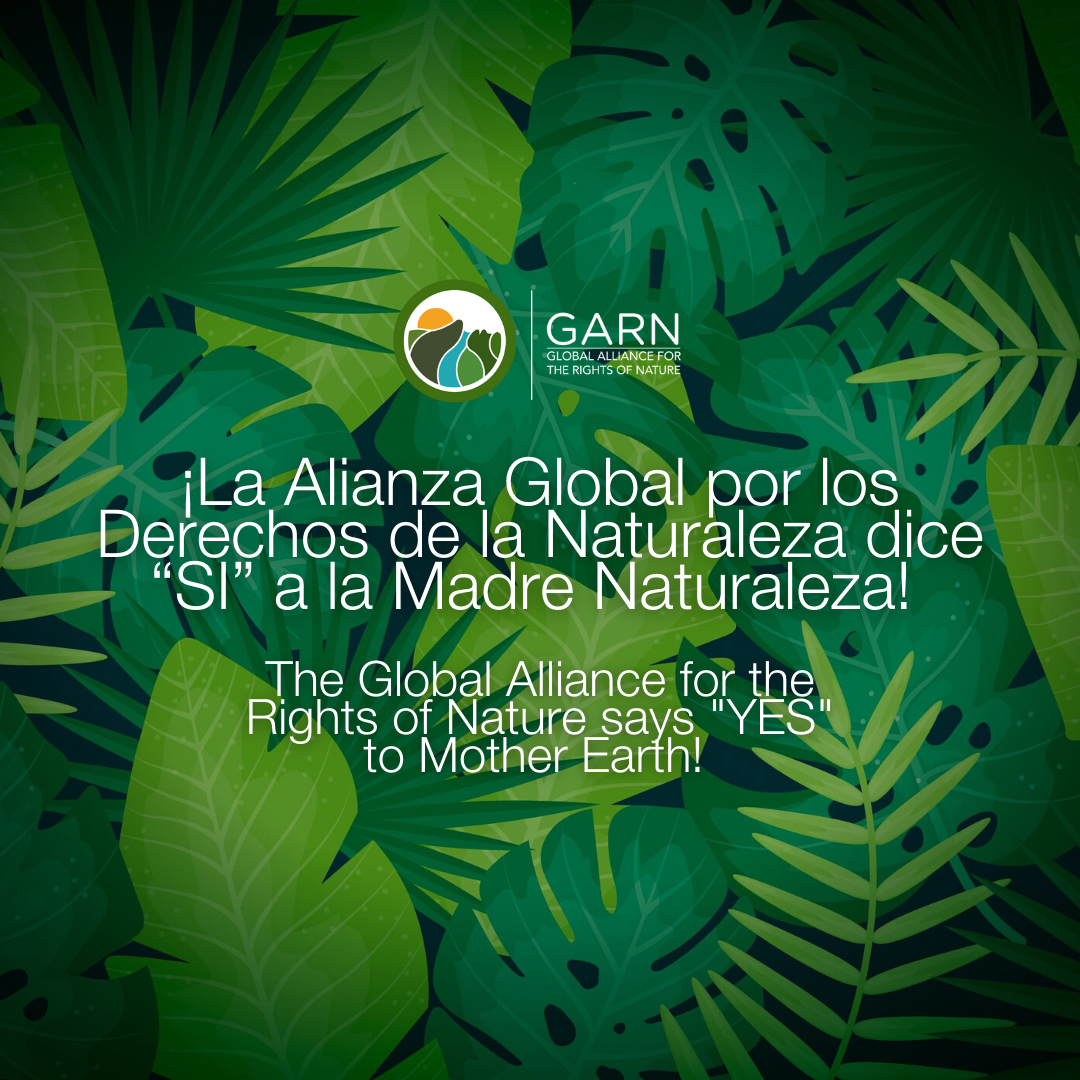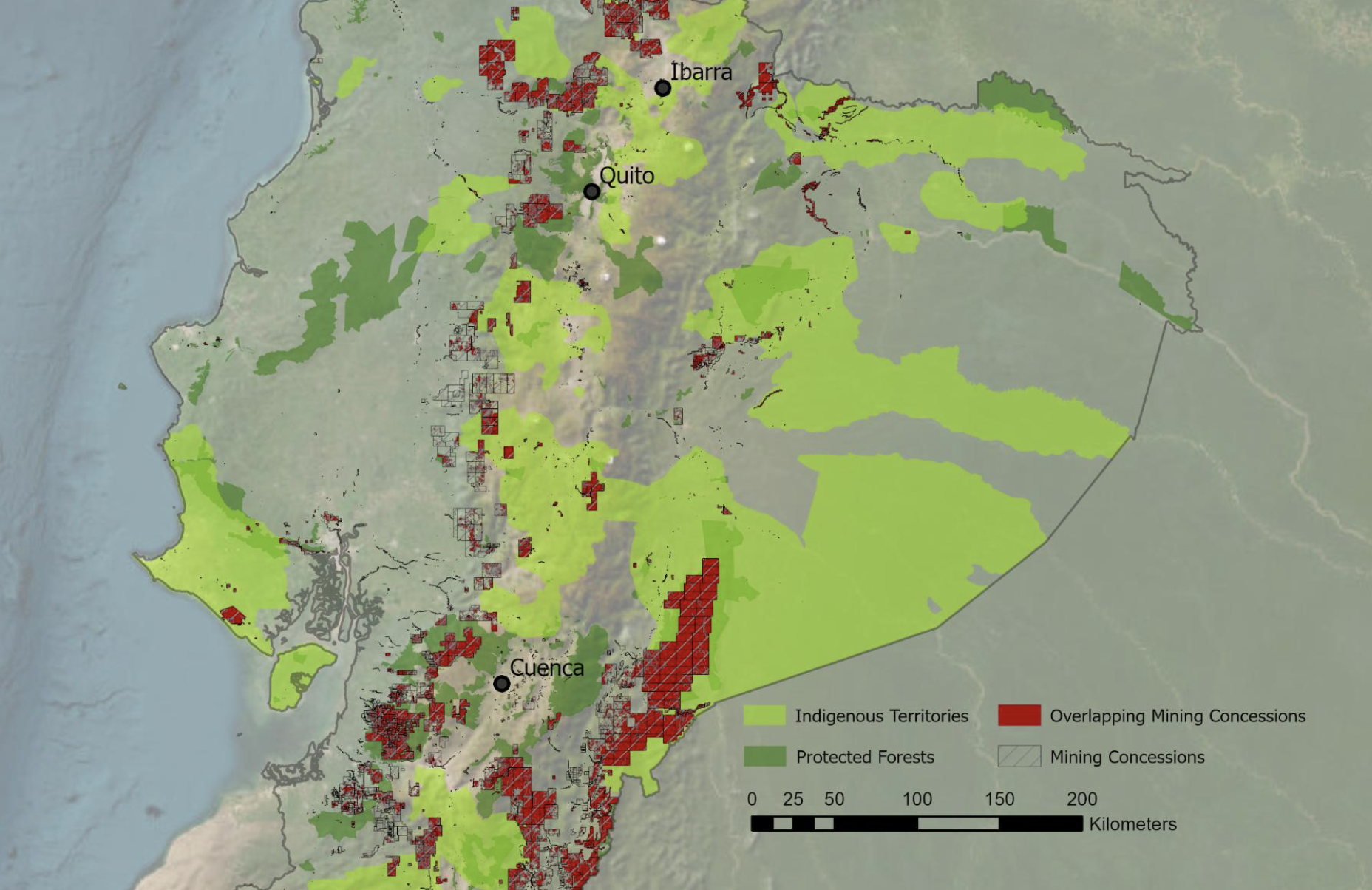¡La Alianza Global por los Derechos de la Naturaleza dice “SI” a la Madre Naturaleza!
Ecuador se enfrenta a la oportunidad de construir un nuevo modelo sin explotación de la Naturaleza (English below)
La Alianza Global por los Derechos de la Naturaleza (GARN) expresa su firme solidaridad con las dos campañas de consultas públicas que buscan proteger a la Naturaleza de la explotación minera:
La campaña “Quito sin minería” tiene como objetivo detener la minería metálica y proteger el Chocó Andino. Esta zona, situada en el noroccidente de la ciudad de Quito, es uno de los últimos bosques que quedan en la región, y la UNESCO la ha declarado como la séptima reserva de biósfera en Ecuador. El Chocó Andino alberga una biodiversidad y un patrimonio cultural inigualables, ya que es uno de los 36 hot spots biológicos del planeta por su alta biodiversidad y especies en peligro de extinción. Actualmente existen 12 concesiones mineras entregadas y otras 6 en trámite. La minería está causando un daño irreparable a esta riqueza natural, y la Consulta Popular brinda la oportunidad de restaurar la justicia en favor de la Naturaleza y de todos los seres que coexisten en este entorno, con una decisión democrática en una consulta popular el 20 de agosto donde todos los quiteños y quiteñas quienes tienen la opción de prohibir la minería artesanal, a pequeña, mediana y gran escala en el Chocó Andino.
→ Puedes encontrar la campaña “Quito sin minería” aquí: quitosinmineria.com/
La campaña “Sí al Yasuní” tiene como objetivo detener la explotación petrolera del ITT, también conocido como el Bloque 43, y proteger la Amazonía.
El Tribunal Internacional de los Derechos de la Naturaleza escuchó el Caso Yasuní tanto en Tribunales internacionales como locales desde el 2014. Sus veredictos afirmaron que la explotación petrolera en esta zona viola los Derechos de la Naturaleza, los derechos de los pueblos en aislamiento voluntario y los derechos de participación política de los ecuatorianos debido a la falta de consulta a raíz del fraude contra el Colectivo Yasunidos.
→ Puedes encontrar el veredicto final del Tribunal aquí: garn.org/veredicto-del-tribunal-caso-yasuni/
Después de más de 10 años de ardua lucha, finalmente se ha logrado la organización de la consulta pública, donde los ciudadanos y ciudadanas de Ecuador podrán expresar sus opiniones sobre el Bloque 43 y el futuro del Yasuní.
El Yasuní forma parte de la región amazónica del Ecuador, considerada la más biodiversa del planeta y hogar de diversos pueblos indígenas. La explotación petrolera en el Bloque 43 ha causado deforestación, violencia y contaminación del agua, poniendo en peligro a especies como los delfines rosados y los jaguares, y a los pueblos indígenas en aislamiento.
→ Puedes encontrar la campaña “Sí al Yasuní” aquí: sialyasuni.com/
Hoy, GARN se une a la lucha por un Quito sin minería y un rotundo “Sí” al Yasuní. Estas consultas populares son hitos históricos, ya que son las primeras a nivel nacional y representan una gran oportunidad para que Ecuador construya un futuro más justo y post extractivista, sin explotación de la Naturaleza y sí honrando y respetando sus derechos. Votar a favor de un Quito sin minería y dar un “Sí” al Yasuní son las acciones más concretas que las ecuatorianas y los ecuatorianos pueden tomar hoy para enfrentar la crisis climática y defender la vida.
The Global Alliance for the Rights of Nature says “YES” to Mother Earth!
Ecuador faces the opportunity to build a new model without exploiting Nature
The Global Alliance for the Rights of Nature (GARN) expresses its strong solidarity with the two public campaigns that seek to protect Nature from mining exploitation:
The “Quito without mining” campaign aims to stop metallic mining and protect the Chocó Andino. This area, located northwest of the city of Quito, is one of the last remaining forests in the region. UNESCO has declared it the seventh biosphere reserve in Ecuador. The Andean Chocó is home to unparalleled biodiversity and cultural heritage, as it is one of the 36 biological hot spots on the planet due to its high biodiversity and endangered species. There are currently 12 mining concessions in place and another 6 in the pipeline. Mining is causing irreparable damage to this natural wealth and the upcoming public vote provides an opportunity to restore justice in favor of Nature and all beings that coexist in this environment with a democratic decision in a popular consultation on August 20 where all Quiteños and Quiteñas who have the option to ban artisanal, small, medium, and large-scale mining in the Andean Chocó.
→ You can find the “Quito without mining” campaign here: quitosinmineria.com/
The “Yes to Yasuní” campaign aims to stop oil exploitation of the ITT, also known as Block 43, and protect the Amazon.
The International Rights of Nature Tribunal has heard the Yasuní Case in both international and local Tribunals since 2014. Their verdicts declared that oil exploitation in this area violates the Rights of Nature, the rights of peoples in voluntary isolation, and the rights of political participation of Ecuadorians due to the lack of consultation following the fraud against the Yasunidos Collective.
→ You can find the final verdict of the Tribunal here: garn.org/veredicto-del-tribunal-caso-yasuni/
After more than 10 years of arduous struggle, the organization of a public vote has finally been successful, and the citizens of Ecuador will be able to express their opinions on Block 43 and the future of Yasuní.
Yasuní is part of Ecuador’s Amazon region, considered the most biodiverse on the planet and home to diverse communities of Indigenous Peoples. Oil exploitation in Block 43 has caused deforestation, violence, and water contamination, endangering species such as pink dolphins and jaguars, and Indigenous Peoples in isolation.
→ You can find the “Yes to Yasuní” campaign here: sialyasuni.com/
Today, GARN joins the fight for a Quito without mining and a resounding “Yes” to Yasuní. These ballot initiatives or public referendums are historic milestones, as they are the first at the national level and represent a great opportunity for Ecuador to build a more just and post-extractivist future, without exploiting Nature and honoring and respecting its rights.” If Ecuadorians vote in favor of a Quito without mining and say “Yes” to Yasuní, this will be a major win for protecting the Rights of Nature and confronting climate change.


